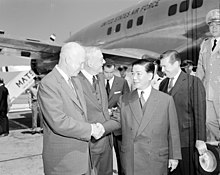
Upon learning of Diệm's ouster and assassination, Hồ Chí Minh reportedly stated: "I can scarcely believe the Americans would be so stupid."[122] The North Vietnamese Politburo was more explicit:
"The consequences of the 1 November coup d'état will be contrary to the calculations of the US imperialists ... Diệm was one of the strongest individuals resisting the people and Communism. Everything that could be done in an attempt to crush the revolution was carried out by Diệm. Diệm was one of the most competent lackeys of the US imperialists ... Among the anti-Communists in South Vietnam or exiled in other countries, no one has sufficient political assets and abilities to cause others to obey. Therefore, the lackey administration cannot be stabilized. The coup d'état on 1 November 1963 will not be the last."[122]
The Ken Burns PBS “documentary’ on the Vietnam War was largely a selective view through the lens of leftist mythology.
-- Michael Lind
The late Harry G. Summers, Jr., Colonel of Infantry and distinguished faculty member of the Army War College, often called people’s attention to the fact that considerable differences in the treatment of the Vietnam War can be seen in the literature published in academia and that published by the veterans who served during the war. Summers also called attention to the fact that the perspective of the veterans differs considerably among themselves according to the time frame of their involvement and their role.
The U.S. involvement in the war began in a
counterinsurgency role, but soon after the disastrous overthrow of South
Vietnamese President Ngo Dinh Diem, foolishly encouraged by the Kennedy
Administration in November 1963, we were involved in trying to hurl
back major North Vietnamese Army (NVA) offensives. The removal and
subsequent murder of Diem by South Vietnamese coup leaders resulted in
over two years of political and military instability in South Vietnam.
Both President Johnson and President Nixon called this orchestrated
regime change one of the biggest mistakes of the war. North Vietnamese
leaders could hardly believe their good fortune and responded with a
massive escalation of NVA troops, weapons, and supplies. The U.S.
responded with steadily increasing troop levels, but President Johnson
and Secretary of Defense McNamara pursued a policy of timid “graduated
response” and refused the requests of the Pacific Area Commander,
Admiral Sharp, and the Joint-Chiefs-of-Staff to bring the full weight of
U.S. Air and Sea power against North Vietnamese strategic targets.
Starting with Ia Drang in 1965 and ending with the heavily mechanized
NVA Easter offensive in 1972, the conflict became a more conventional
war, but with the U.S. allowing enemy sanctuaries in Cambodia, Laos, and
North Vietnam and holding back from its potential to devastate
strategic targets in North Vietnam. Admiral Sharp called the latter
policy “powder puff” warfare in a U.S. Senate hearing.
More@ The Tribune

No comments:
Post a Comment